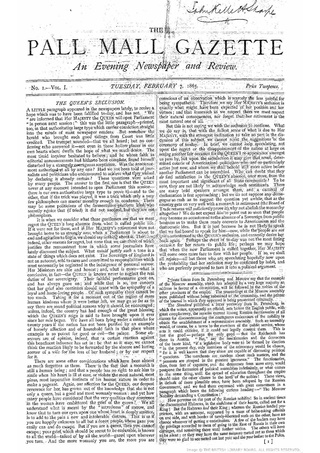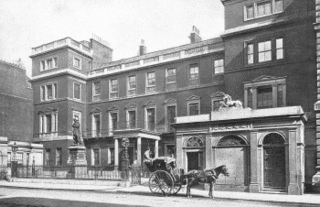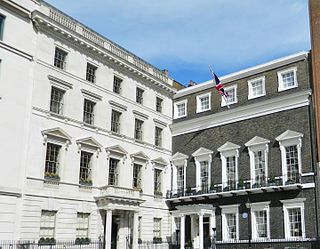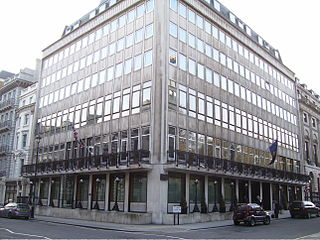Related Research Articles

Marlborough House, a Grade I listed mansion on The Mall in St James's, City of Westminster, London, is the headquarters of the Commonwealth of Nations and the seat of the Commonwealth Secretariat. It is adjacent to St James's Palace.

The Royal Aero Club (RAeC) is the national co-ordinating body for air sport in the United Kingdom. It was founded in 1901 as the Aero Club of Great Britain, being granted the title of the "Royal Aero Club" in 1910.

Pall Mall is a street in the St James's area of the City of Westminster, Central London. It connects St James's Street to Trafalgar Square and is a section of the regional A4 road. The street's name is derived from pall-mall, a ball game played there during the 17th century, which in turn is derived from the Italian pallamaglio, literally "ball-mallet".

The Pall Mall Gazette was an evening newspaper founded in London on 7 February 1865 by George Murray Smith; its first editor was Frederick Greenwood. In 1921, The Globe merged into The Pall Mall Gazette, which itself was absorbed into The Evening Standard in 1923.

St James's is a central district in the City of Westminster, London, forming part of the West End. The area was once part of the northwestern gardens and parks of St. James's Palace. During the Restoration in the 17th century, the area was developed as a residential location for the British aristocracy, and around the 19th century was the focus of the development of their gentlemen's clubs. Once part of the parish of St Martin in the Fields, much of it formed the parish of St James from 1685 to 1922. Since the Second World War the area has transitioned from residential to commercial use.

The Travellers Club is a private gentlemen's club situated at 106 Pall Mall in London, United Kingdom. It is the oldest of the surviving Pall Mall clubs, established in 1819, and is one of the most exclusive. It was described as "the quintessential English gentleman's club" by the Los Angeles Times in 2004.

Cumberland House was a mansion on the south side of Pall Mall in London, England. It was built in the 1760s by Matthew Brettingham for Prince Edward, Duke of York and Albany and was originally called York House. The Duke of York died in 1767 aged just twenty eight and the house was taken over by Prince Henry, Duke of Cumberland and Strathearn, whose name it has retained.

Schomberg House at 80–82 Pall Mall is a prominent house on the south side of Pall Mall in central London which has a colourful history. Only the street facade survives today. It was built for the 3rd Duke of Schomberg, a Huguenot general in the service of the British Crown. It was adapted from Portland House, which in turn had been created by the Countess of Portland by converting two houses into a single residence. Work began in 1694, the year after the duke inherited his title.

The Naval and Military Club, known informally as The In & Out, is a private members' club located in St James's Square, London. It was founded in 1862 for officers of the Navy and Army. It now also accepts female members, and members who have not served in the armed forces, but continues to observe service traditions.

The Oxford and Cambridge Club is a traditional London club. Membership is largely restricted to those who are members of the universities of Oxford and Cambridge, including men and women who have a degree from or who are current students of either university.

Den Norske Klub is a social club based in London. It was founded on 17 May 1887. Its members are Norwegians living in London or Britons with a connection to or interest in Norway. It is the oldest club of its kind in the UK and is still an important meeting place for the Norwegian community in London.

Boodle's is a gentlemen's club in London, England, with its clubhouse located at 28 St James's Street. Founded in January 1762 by Lord Shelburne, who later became Prime Minister of the United Kingdom and then 1st Marquess of Lansdowne, it is the second oldest private members' club in London and in the world.
The Guards Club, established in 1810, was a London Gentlemen's club for officers of the Guards Division, originally defined by the club as being the Coldstream Guards, Grenadier Guards or Scots Guards, traditionally the most socially elite section of the British Army. Officers of the Welsh and Irish Guards were not able to join until the second half of the 20th century. Its clubhouse at 70 Pall Mall was the first to be built on that street, which later became noted for its high concentration of clubs; earlier clubs had been focused on the adjoining St James's Street.

The Army and Navy Club in London is a private members' club founded in 1837 for British Army and Royal Navy Officers, it also known informally as The Rag. The Club offers Military membership to anyone who holds or has held a Commission in the British Armed Forces or in Commonwealth Forces, the club also now accepts applications for Non Military membership.
The Unionist Club was a short-lived London gentlemen's club, now dissolved, which was established in 1886, and had wound up by 1892. For the last four years of its existence, it had a clubhouse at 66-68 Pall Mall.
The Beaconsfield Club was a London gentlemen's club, now dissolved, which was established in 1880 and was disbanded circa 1887–8. For most of its existence, between 1880 and 1887, it occupied 66-68 Pall Mall, London.

The Junior Carlton Club was a London gentlemen's club, now dissolved, which was established in 1864 and was disbanded in 1977.

The Cavalry and Guards Club is a London gentlemen's club, at 127 Piccadilly, situated next to the RAF Club.

The United Service Club was a London gentlemen's club founded in 1815 for the use of senior officers in the British Army and Royal Navy – those above the rank of Major or Commander – and the club was accordingly known to its members as "The Senior". The club closed in 1978.